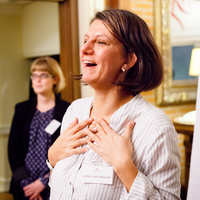
Martyn Barrett
Martyn Barrett is Emeritus Professor of Psychology at the University of Surrey, UK. He obtained his degrees from the Universities of Cambridge and Sussex. He is a developmental and social psychologist but has a strong commitment to multidisciplinary research, and he has worked with educationalists, sociologists, anthropologists, political scientists and policy analysts.
His work focuses on: the development of intercultural competence; the development of political and civic engagement; the development of intergroup attitudes, prejudice and stereotyping; and national, ethnic, political and civic enculturation.
Over the years, he has received numerous research grants from the European Commission, the ESRC, the Leverhulme Trust, the Nuffield Foundation, and various other bodies. He has led three international research projects funded by the European Commission. He also works as an expert for the Council of Europe on the development of intercultural and democratic competence. In this capacity, he led a flagship project for the Council of Europe that produced a new European reference framework of the competences which young people require to participate effectively in democratic culture and intercultural dialogue (for further information, see www.coe.int/competences).
Recent books include Interculturalism and Multiculturalism: Similarities and Differences (2013, Council of Europe Publishing), Developing Intercultural Competence through Education (2014, Council of Europe Publishing), and Youth Civic and Political Engagement (2019, Routledge).
He is a Fellow of the British Psychological Society and a Fellow of the Academy of Social Sciences.
Further information about his research interests is available from his web page: www.martynbarrett.com
Address: School of Psychology
University of Surrey
Guildford
Surrey GU2 7XH
UK
His work focuses on: the development of intercultural competence; the development of political and civic engagement; the development of intergroup attitudes, prejudice and stereotyping; and national, ethnic, political and civic enculturation.
Over the years, he has received numerous research grants from the European Commission, the ESRC, the Leverhulme Trust, the Nuffield Foundation, and various other bodies. He has led three international research projects funded by the European Commission. He also works as an expert for the Council of Europe on the development of intercultural and democratic competence. In this capacity, he led a flagship project for the Council of Europe that produced a new European reference framework of the competences which young people require to participate effectively in democratic culture and intercultural dialogue (for further information, see www.coe.int/competences).
Recent books include Interculturalism and Multiculturalism: Similarities and Differences (2013, Council of Europe Publishing), Developing Intercultural Competence through Education (2014, Council of Europe Publishing), and Youth Civic and Political Engagement (2019, Routledge).
He is a Fellow of the British Psychological Society and a Fellow of the Academy of Social Sciences.
Further information about his research interests is available from his web page: www.martynbarrett.com
Address: School of Psychology
University of Surrey
Guildford
Surrey GU2 7XH
UK
less
Related Authors
Nancy Papathanasiou
National & Kapodistrian University of Athens
Bruna Zani
Università di Bologna
Bryony Hoskins
Roehampton University
Maria Lo Cricchio
Università della Basilicata
Anna Lavizzari
Universidad Complutense de Madrid
Laden Yurttagüler
Bogazici University
Andres Sandoval-Hernandez
University of Bath
Maria Perez
Universidad Autónoma de Aguascalientes
InterestsView All (53)






Uploads
Books by Martyn Barrett
Phase two of the project will be devoted to the development of descriptors (i.e., statements or descriptions of what a person is able to do if they have mastered the various competences that are specified by the model), phase three to ascertaining whether it is possible to assign the descriptors to levels of proficiency, and phase four to the production of supporting documentation. This documentation will be addressed to educational practitioners and policymakers, and will provide a less technical description of the current competence model. It will also explain how the model and the descriptors can be used to assist curriculum design, pedagogical design and the development of new forms of assessment (for use in either self-assessment or assessment by others).
All of the materials that are produced from the project will eventually be incorporated into a ‘Council of Europe Reference Framework of Competences for Democratic Culture’.
Further information about the project is available from the project website:
www.coe.int/competences
The relationship between these two approaches has been a matter of intense debate in recent years. Some commentators argue that they represent two very different approaches, while others argue that interculturalism merely re-emphasises some of the core elements of present-day multiculturalism. The debate arises, in part, because multiculturalism can take a variety of different forms, which makes it difficult to identify its key features in order to compare it with interculturalism. The debate has gained added momentum from the backlash against multiculturalism in recent years, and from the Council of Europe’s prominent championing of interculturalism as an alternative approach.
This book aims to clarify the concepts of interculturalism and multiculturalism, and to bring the various arguments together in a way that will assist politicians, policymakers, practitioners and interested lay people to understand the concerns that are driving the different orientations. The book is also intended to facilitate a comparison of the policy implications of interculturalism and multiculturalism. To this end, each chapter concludes with a concise statement of the implications for policy that follow from the viewpoint that has been expressed.
Edited by Louis Oppenheimer and Martyn Barrett, M. (2011).
Special Issue of the European Journal of Developmental Psychology, Volume 8, Issue 1.
The purpose of this special issue is to report on the findings from eight studies dealing with national identity and ingroup-outgroup attitudes in 7- and 11-year-old children from countries that have not experienced violence or war in the recent past (England and The Netherlands) and countries that have recently been or still are subject to armed conflict or intergroup violence (Israel, Bosnia, North and South Cyprus, Northern Ireland, and the Basque Country). In total 12 national groups participated in the studies involving Jewish and Arab children (Israel), Bosniak and Serbian children (Bosnia), Catholic and Protestant children (Northern Ireland), North and South Cypriot children (Cyprus), Basque and Spanish children (the Basque Country), and Dutch and English children (The Netherlands and England).
As the papers in this special issue reveal, the development of national identifications and national attitudes shows considerable cross-national variation as a function of the specific socio-historical contexts within which children develop. These studies, considered together, indicate the need for developmental theorising within this area to avoid simplistic conclusions based upon data collected within just one specific location, and to instead adopt a broader cross-national comparative perspective when attempting to address questions concerning how children’s national identifications and attitudes develop within real-world settings.
Contents
Louis Oppenheimer and Martyn Barrett
Introduction to the Special Issue
Martyn Barrett and Louis Oppenheimer
Findings, theories and methods in the study of children’s national identifications and national attitudes
Daisy Clay and Martyn Barrett
National identifications and attitudes towards a ‘traditional enemy’ nation among English children
Louis Oppenheimer and Emina Midzic
National identification and ingroup-outgroup evaluations with Bosniak and Serbian children in Bosnia.
Elizabeth Gallagher and Ed Cairns
National identity and ingroup-outgroup attitudes: Catholic and Protestant children in Northern Ireland.
Biran Mertan
Children's perception of national identity and ingroup-outgroup evaluations: Turkish-Cypriot school children
Panayiotis Stavrinides and Stelios Georgiou
National identity and ingroup-outgroup evaluations with Greek-Cypriot children
Luixa Reizabal and Garbiñe Ortiz
National Identity and ingroup-outgroup attitudes with Basque and Basque-Spanish children growing up in the Basque Country.
Louis Oppenheimer
Comparative analyses: Are there discernable patterns in the development of and relationships among national identification and ingroup-outgroup evaluations?
Edited by Martyn Barrett, Tatiana Riazanova and Margarita Volovikova (2001)
Moscow: Institute of Psychology, Russian Academy of Sciences (IPRAS) Publisher
This book has grown out of the collaborative teamwork of a group of psychologists from Great Britain, Azerbaijan, Georgia, Ukraine and Russia. The research investigated the development of religious, national and ethnolinguistic identity in children under contemporary political and social conditions. Research was conducted into three main problems: the processes of national, ethnolinguistic and religious self-categorization and subjective identification in Russian, Ukrainian, Georgian and Azeri children; the representations which Russian, Ukrainian, Georgian and Azeri children hold about their own national characteristics; and the development of Russian, Ukrainian, Georgian and Azeri children’s attitudes towards other nations.
Book contents
Martyn Barrett, Tatiana Riazanova and Margarita Volovikova
Preface
Martyn Barrett
The development of national identity: a conceptual analysis and somedata from Western European studies
R.R.Karakozov, R.G.Kadirova
Socio-cultural and cognitive factors in Azeri children and adolescents' identity formation
Giorgi Kipiani
Ethnic identification in the structure of personal identifications and sociocultural conditions of development
Pavlenko V., Kryazh I., Ivanova O., Barrett M.
Age characteristics of social identifications and ethno-national beliefs in Ukraine
M.Volovikova, T.Ryazanova, L.Grenkova-Dikevich
The specificities of religious identification in contemporary Russia: an analysis of answers given by children from Smolemsk
Margarita Volovikova, Оlga Кuznetzova
Representations about Europe and Europeans of Children and Adolescents Who Live in Moscow region and in Stanitsa Veshenskaya (on the Don River)
Riazanova, T., Sergienko, E., Grenkova-Dikevitch, L., Gorodetschnaya, N., Barrett, M.
Cognitive aspects of ethno-national identity development in Russian children and adolescents
Edited by Martyn Barrett, Christopher Flood and John Eade
Nationalism, ethnicity and citizenship lie at the heart of many of the societal changes that are currently transforming countries across the world. Global migration has undermined old certainties provided by the established framework of nation-states, with inward migration, cultural diversity and transnational affiliations having become established facts of life in many countries. These phenomena raise significant challenges for traditional conceptions of citizenship.
This book provides a detailed examination, from a variety of disciplinary perspectives, of contemporary issues relating to nationalism, ethnicity and citizenship. The book aims to take stock of current understandings in this area, and to establish whether there are connections between the understandings that are being articulated within different social science disciplines. The contributors, who are all senior international figures in their respective fields, are drawn from a range of disciplines, including Politics, Sociology, Communication/Media, Geography, Psychology and Education. Collectively, they address the following specific questions:
• To what extent do multiculturalism and transnationalism undermine nationalism or, on the contrary, provoke its reassertion?
• How do the multiple identities and multiple levels of belonging experienced today interact with traditional nationalist ideology?
• Within multicultural societies, how far do representations of ‘cultural others’ still play a role in nationalist constructions of ‘the nation’?
• How successfully have the welfare systems of nation-states responded to the influx of migrants?
• How have national politicians responded to the cultural diversity of their own countries and have they moved beyond the traditional logic of nationalism within their thinking?
• Why are extreme right-wing parties gaining increased levels of support?
• What social and psychological resources do citizens require in order to function effectively at the political level within multicultural democratic societies?
• How can the educational systems of states, which have traditionally been used for nationalist purposes, be harnessed to enhance the competences needed by their citizens for successful living in multicultural societies?
• What changes need to be made to educational policies in order to ensure the effective integration of minority citizens?
Despite the fact that they have been written from different disciplinary perspectives, the various chapters in this book paint a consistent picture. They offer a view of a world in which nationalism is still very much a dominant ideology which configures the discourse and thinking of citizens and politicians alike about nation-states, ethnic diversity, multiculturalism and citizenship. The crucial role of education is also highlighted, with school systems being uniquely positioned to equip citizens with the psychological resources and intercultural competences that are needed to function effectively within multicultural societies.
Book contents
List of Contributors
Preface
Martyn Barrett, Christopher Flood and John Eade
Nationalism, Ethnicity, Citizenship: Multidisciplinary Perspectives –
An Introduction
Martyn Barrett, Christopher Flood and John Eade
Is Nationalism an Anachronism? Notes on the Mutations of National Idealism in a Global Age
Ulf Hedetoft
Nationalism, Belonging, Globalization and the ‘Ethics of Care’
Nira Yuval-Davis
Representing the Nation and the Muslim Other: Television News Coverage in Three Countries
Christopher Flood, Stephen Hutchings, Galina Miazhevich
and Henri Nickels
Citizenship, Ethnicity and Mainstream Society: The European Welfare States Navigating between Exclusion and Inclusion
Hans van Amersfoort
Rebranding Britain? Ideological Dilemmas in Political Appeals
to “British Multiculturalism”
Susan Condor
What does it take to be a Political Actor in a Multicultural Society?
Nicholas P. Emler
Intercultural Citizenship – An Education Perspective
Michael Byram
Integrationist to Citizenship Education Policy within England:
A Forward Movement or a Backward Step?
Richard Race
Name Index
Subject Index
This edited collection is intended to be a major contribution to studies of multiculturalism examining the historical background and anthropological context, alongside more contemporary applied social policy perspectives. In this volume, we argue that a multicultural perspective is as relevant and important, both socially and politically in a post 7/7 world. Within a post 7/7 context, there are contributors within this edited collection who argue for both integrationist and multicultural approaches. The volume acknowledges both concepts and encourages the reader to increase understandings of both arguments and position her / himself within the debates.
Book contents
Preface
Eade J., Barrett, M., Flood C.
Introduction Advancing Multiculturalism, Post 7/7
Race, R.
The Historical Conditions for Multiculturalism
Breuilly, J.
Ethnic-Identity in a Multicultural Society
Rex, J.
Problem-Finding in Ethnic and Racial Studies
Banton, M
What does Multiculturalism have to do with Culture?
Keba, A.
Minority Professionals’ Experience of Marginalisation and Exclusion:
The Rules of Ethnic Engagement
Ballard, R., Parvenn, T.
Multiculturalism in Germany
Eckardt, F.
Core Ethnicities and the Problem of Multiculturalism: The British Case
Kumar, K.
Remaking Multiculturalism, post 7/7
Modood, T.
The Future of Multicultural Britain
Johnson, N., Verlot, M.
Contributor Biographies
Index
Children’s Understanding of Society will be an invaluable resource for undergraduate students taking courses in Developmental Psychology, the Sociology of Childhood, and Education. The book will also be of considerable interest to postgraduate students and researchers working in all of these fields for its state-of-the-art reviews.
Book Contents
Chapter 1
Emergent Themes in the Study of Children’s Understanding of Society
Martyn Barrett and Eithne Buchanan-Barrow
Chapter 2
Children’s Understanding of the School
Eithne Buchanan-Barrow
Chapter 3
Children’s Understanding of Economics
Paul Webley
Chapter 4
Children's Understanding of Politics
Anna Emilia Berti
Chapter 5
Children’s Understanding of the Law and Legal Processes
Stephen J. Ceci, Faith A. Markle and Yoo Jin Chae
Chapter 6
Children’s Understanding of Gender Roles in Society
Kevin Durkin
Chapter 7
Children’s Understanding of Social Class and Occupational Groupings
Nicholas Emler and Julie Dickinson
Chapter 8
Children’s Understanding of Racial Groups
Lawrence A. Hirschfeld
Chapter 9
Children's Understanding of Ethnic Belonging and the Development of Ethnic Attitudes
Alida Lo Coco, Cristiano Inguglia and Ugo Pace
Chapter 10
Children’s Understanding of, and Feelings about, Countries and National Groups
Martyn Barrett
Chapter 11
The Development of Societal Cognition: A Commentary
Giyoo Hatano and Keiko Takahashi
Author index
Subject index
Martyn Barrett
in collaboration with Luciano Arcuri, Mark Bennett, Anna Emilia Berti, Anna Silvia Bombi, Luigi Castelli, Annamaria de Rosa, Arantza del Valle, Rauf Garagozov, Almudena Giménez de la Peña, Thea Kacharava, Giorgi Kipiani, Evanthia Lyons, Valentyna Pavlenko, Santiago Perera, Luixa Reizábal, Tatiana Riazanova, Fabio Sani, Jose Valencia and Ignasi Vila
2007
Published by Psychology Press, Hove, UK.
ISBN: 1-84169-301-4
“This is a very impressive monograph bearing every prospect of becoming a landmark in its field. It combines an exceptionally scholarly review of the historical and current literature on children and national identity with an account of the findings of a unique and ambitious series of multi-context, international studies. The results are fascinating and are interpreted meticulously. This is a terrific book, which I thoroughly enjoyed and know that I’ll be dipping back into repeatedly.”
Kevin Durkin, Professor, Department of Psychology, University of Strathclyde
“The field has all too little ambitious cross-cultural and inter-disciplinary research like this. One really gets a sense here of the diversity and complexity of children’s national identifications and inter-nation attitudes. It will certainly serve as the point of departure for many investigations in the future, and researchers and students will find much to their benefit in these pages.”
Rupert Brown, Professor of Social Psychology, University of Sussex
This book provides a state-of-the-art account of how people’s understanding of, and attitudes towards, nations and national groups develop through the course of childhood and adolescence. It offers a comprehensive review of the research which has been conducted into:
• children’s understanding of nations and states as geographical territories and as political, historical and cultural communities
• children’s knowledge, beliefs and feelings about the people who belong to different national and state groups
• children’s attitudes towards, and emotional attachment to, their own country and their own national and state groups
The book elaborates on the developmental patterns that have been found to emerge, contextualized by a consideration and evaluation of the theoretical frameworks which can be used to explain these patterns.
Written by the leading international authority in this field, and reporting (in collaboration with colleagues) the findings from two major cross-national research projects, this book will be a seminal text to reopen the field and will be invaluable for post-graduate students and researchers. The book will also be of benefit to undergraduate students taking courses in psychology, sociology, education, geography and political science.
Martyn Barrett studied at the Universities of Cambridge and Sussex, and is Professor of Psychology at the University of Surrey. He is a Fellow of the British Psychological Society, Editor of the British Journal of Developmental Psychology, Academic Director of the Centre for Research on Nationalism, Ethnicity and Multiculturalism at the University of Surrey, and an Academician of the Learned Societies for the Social Sciences.
Contents
• About the author
• Preface
• Chapter 1: On Children, Nations and National Groups
• Chapter 2: Children’s Knowledge, Beliefs and Feelings about Countries Construed as Geographical Territories
• Chapter 3: Children’s Knowledge, Beliefs and Feelings about the State Construed as a Political Entity
• Chapter 4: Children’s Knowledge, Beliefs and Feelings about Nations and States Construed as Historical and Cultural Communities
• Chapter 5: Children’s Knowledge, Beliefs and Feelings about the People who Belong to Different National and State Groups
• Chapter 6: The Development of Children’s Subjective Identifications with their own Nation and State
• Chapter 7: Theoretical Accounts of How Children’s Knowledge, Beliefs and Feelings about Nations and States Develop
• References
• Author index
• Subject index
Papers by Martyn Barrett
Phase two of the project will be devoted to the development of descriptors (i.e., statements or descriptions of what a person is able to do if they have mastered the various competences that are specified by the model), phase three to ascertaining whether it is possible to assign the descriptors to levels of proficiency, and phase four to the production of supporting documentation. This documentation will be addressed to educational practitioners and policymakers, and will provide a less technical description of the current competence model. It will also explain how the model and the descriptors can be used to assist curriculum design, pedagogical design and the development of new forms of assessment (for use in either self-assessment or assessment by others).
All of the materials that are produced from the project will eventually be incorporated into a ‘Council of Europe Reference Framework of Competences for Democratic Culture’.
Further information about the project is available from the project website:
www.coe.int/competences
The relationship between these two approaches has been a matter of intense debate in recent years. Some commentators argue that they represent two very different approaches, while others argue that interculturalism merely re-emphasises some of the core elements of present-day multiculturalism. The debate arises, in part, because multiculturalism can take a variety of different forms, which makes it difficult to identify its key features in order to compare it with interculturalism. The debate has gained added momentum from the backlash against multiculturalism in recent years, and from the Council of Europe’s prominent championing of interculturalism as an alternative approach.
This book aims to clarify the concepts of interculturalism and multiculturalism, and to bring the various arguments together in a way that will assist politicians, policymakers, practitioners and interested lay people to understand the concerns that are driving the different orientations. The book is also intended to facilitate a comparison of the policy implications of interculturalism and multiculturalism. To this end, each chapter concludes with a concise statement of the implications for policy that follow from the viewpoint that has been expressed.
Edited by Louis Oppenheimer and Martyn Barrett, M. (2011).
Special Issue of the European Journal of Developmental Psychology, Volume 8, Issue 1.
The purpose of this special issue is to report on the findings from eight studies dealing with national identity and ingroup-outgroup attitudes in 7- and 11-year-old children from countries that have not experienced violence or war in the recent past (England and The Netherlands) and countries that have recently been or still are subject to armed conflict or intergroup violence (Israel, Bosnia, North and South Cyprus, Northern Ireland, and the Basque Country). In total 12 national groups participated in the studies involving Jewish and Arab children (Israel), Bosniak and Serbian children (Bosnia), Catholic and Protestant children (Northern Ireland), North and South Cypriot children (Cyprus), Basque and Spanish children (the Basque Country), and Dutch and English children (The Netherlands and England).
As the papers in this special issue reveal, the development of national identifications and national attitudes shows considerable cross-national variation as a function of the specific socio-historical contexts within which children develop. These studies, considered together, indicate the need for developmental theorising within this area to avoid simplistic conclusions based upon data collected within just one specific location, and to instead adopt a broader cross-national comparative perspective when attempting to address questions concerning how children’s national identifications and attitudes develop within real-world settings.
Contents
Louis Oppenheimer and Martyn Barrett
Introduction to the Special Issue
Martyn Barrett and Louis Oppenheimer
Findings, theories and methods in the study of children’s national identifications and national attitudes
Daisy Clay and Martyn Barrett
National identifications and attitudes towards a ‘traditional enemy’ nation among English children
Louis Oppenheimer and Emina Midzic
National identification and ingroup-outgroup evaluations with Bosniak and Serbian children in Bosnia.
Elizabeth Gallagher and Ed Cairns
National identity and ingroup-outgroup attitudes: Catholic and Protestant children in Northern Ireland.
Biran Mertan
Children's perception of national identity and ingroup-outgroup evaluations: Turkish-Cypriot school children
Panayiotis Stavrinides and Stelios Georgiou
National identity and ingroup-outgroup evaluations with Greek-Cypriot children
Luixa Reizabal and Garbiñe Ortiz
National Identity and ingroup-outgroup attitudes with Basque and Basque-Spanish children growing up in the Basque Country.
Louis Oppenheimer
Comparative analyses: Are there discernable patterns in the development of and relationships among national identification and ingroup-outgroup evaluations?
Edited by Martyn Barrett, Tatiana Riazanova and Margarita Volovikova (2001)
Moscow: Institute of Psychology, Russian Academy of Sciences (IPRAS) Publisher
This book has grown out of the collaborative teamwork of a group of psychologists from Great Britain, Azerbaijan, Georgia, Ukraine and Russia. The research investigated the development of religious, national and ethnolinguistic identity in children under contemporary political and social conditions. Research was conducted into three main problems: the processes of national, ethnolinguistic and religious self-categorization and subjective identification in Russian, Ukrainian, Georgian and Azeri children; the representations which Russian, Ukrainian, Georgian and Azeri children hold about their own national characteristics; and the development of Russian, Ukrainian, Georgian and Azeri children’s attitudes towards other nations.
Book contents
Martyn Barrett, Tatiana Riazanova and Margarita Volovikova
Preface
Martyn Barrett
The development of national identity: a conceptual analysis and somedata from Western European studies
R.R.Karakozov, R.G.Kadirova
Socio-cultural and cognitive factors in Azeri children and adolescents' identity formation
Giorgi Kipiani
Ethnic identification in the structure of personal identifications and sociocultural conditions of development
Pavlenko V., Kryazh I., Ivanova O., Barrett M.
Age characteristics of social identifications and ethno-national beliefs in Ukraine
M.Volovikova, T.Ryazanova, L.Grenkova-Dikevich
The specificities of religious identification in contemporary Russia: an analysis of answers given by children from Smolemsk
Margarita Volovikova, Оlga Кuznetzova
Representations about Europe and Europeans of Children and Adolescents Who Live in Moscow region and in Stanitsa Veshenskaya (on the Don River)
Riazanova, T., Sergienko, E., Grenkova-Dikevitch, L., Gorodetschnaya, N., Barrett, M.
Cognitive aspects of ethno-national identity development in Russian children and adolescents
Edited by Martyn Barrett, Christopher Flood and John Eade
Nationalism, ethnicity and citizenship lie at the heart of many of the societal changes that are currently transforming countries across the world. Global migration has undermined old certainties provided by the established framework of nation-states, with inward migration, cultural diversity and transnational affiliations having become established facts of life in many countries. These phenomena raise significant challenges for traditional conceptions of citizenship.
This book provides a detailed examination, from a variety of disciplinary perspectives, of contemporary issues relating to nationalism, ethnicity and citizenship. The book aims to take stock of current understandings in this area, and to establish whether there are connections between the understandings that are being articulated within different social science disciplines. The contributors, who are all senior international figures in their respective fields, are drawn from a range of disciplines, including Politics, Sociology, Communication/Media, Geography, Psychology and Education. Collectively, they address the following specific questions:
• To what extent do multiculturalism and transnationalism undermine nationalism or, on the contrary, provoke its reassertion?
• How do the multiple identities and multiple levels of belonging experienced today interact with traditional nationalist ideology?
• Within multicultural societies, how far do representations of ‘cultural others’ still play a role in nationalist constructions of ‘the nation’?
• How successfully have the welfare systems of nation-states responded to the influx of migrants?
• How have national politicians responded to the cultural diversity of their own countries and have they moved beyond the traditional logic of nationalism within their thinking?
• Why are extreme right-wing parties gaining increased levels of support?
• What social and psychological resources do citizens require in order to function effectively at the political level within multicultural democratic societies?
• How can the educational systems of states, which have traditionally been used for nationalist purposes, be harnessed to enhance the competences needed by their citizens for successful living in multicultural societies?
• What changes need to be made to educational policies in order to ensure the effective integration of minority citizens?
Despite the fact that they have been written from different disciplinary perspectives, the various chapters in this book paint a consistent picture. They offer a view of a world in which nationalism is still very much a dominant ideology which configures the discourse and thinking of citizens and politicians alike about nation-states, ethnic diversity, multiculturalism and citizenship. The crucial role of education is also highlighted, with school systems being uniquely positioned to equip citizens with the psychological resources and intercultural competences that are needed to function effectively within multicultural societies.
Book contents
List of Contributors
Preface
Martyn Barrett, Christopher Flood and John Eade
Nationalism, Ethnicity, Citizenship: Multidisciplinary Perspectives –
An Introduction
Martyn Barrett, Christopher Flood and John Eade
Is Nationalism an Anachronism? Notes on the Mutations of National Idealism in a Global Age
Ulf Hedetoft
Nationalism, Belonging, Globalization and the ‘Ethics of Care’
Nira Yuval-Davis
Representing the Nation and the Muslim Other: Television News Coverage in Three Countries
Christopher Flood, Stephen Hutchings, Galina Miazhevich
and Henri Nickels
Citizenship, Ethnicity and Mainstream Society: The European Welfare States Navigating between Exclusion and Inclusion
Hans van Amersfoort
Rebranding Britain? Ideological Dilemmas in Political Appeals
to “British Multiculturalism”
Susan Condor
What does it take to be a Political Actor in a Multicultural Society?
Nicholas P. Emler
Intercultural Citizenship – An Education Perspective
Michael Byram
Integrationist to Citizenship Education Policy within England:
A Forward Movement or a Backward Step?
Richard Race
Name Index
Subject Index
This edited collection is intended to be a major contribution to studies of multiculturalism examining the historical background and anthropological context, alongside more contemporary applied social policy perspectives. In this volume, we argue that a multicultural perspective is as relevant and important, both socially and politically in a post 7/7 world. Within a post 7/7 context, there are contributors within this edited collection who argue for both integrationist and multicultural approaches. The volume acknowledges both concepts and encourages the reader to increase understandings of both arguments and position her / himself within the debates.
Book contents
Preface
Eade J., Barrett, M., Flood C.
Introduction Advancing Multiculturalism, Post 7/7
Race, R.
The Historical Conditions for Multiculturalism
Breuilly, J.
Ethnic-Identity in a Multicultural Society
Rex, J.
Problem-Finding in Ethnic and Racial Studies
Banton, M
What does Multiculturalism have to do with Culture?
Keba, A.
Minority Professionals’ Experience of Marginalisation and Exclusion:
The Rules of Ethnic Engagement
Ballard, R., Parvenn, T.
Multiculturalism in Germany
Eckardt, F.
Core Ethnicities and the Problem of Multiculturalism: The British Case
Kumar, K.
Remaking Multiculturalism, post 7/7
Modood, T.
The Future of Multicultural Britain
Johnson, N., Verlot, M.
Contributor Biographies
Index
Children’s Understanding of Society will be an invaluable resource for undergraduate students taking courses in Developmental Psychology, the Sociology of Childhood, and Education. The book will also be of considerable interest to postgraduate students and researchers working in all of these fields for its state-of-the-art reviews.
Book Contents
Chapter 1
Emergent Themes in the Study of Children’s Understanding of Society
Martyn Barrett and Eithne Buchanan-Barrow
Chapter 2
Children’s Understanding of the School
Eithne Buchanan-Barrow
Chapter 3
Children’s Understanding of Economics
Paul Webley
Chapter 4
Children's Understanding of Politics
Anna Emilia Berti
Chapter 5
Children’s Understanding of the Law and Legal Processes
Stephen J. Ceci, Faith A. Markle and Yoo Jin Chae
Chapter 6
Children’s Understanding of Gender Roles in Society
Kevin Durkin
Chapter 7
Children’s Understanding of Social Class and Occupational Groupings
Nicholas Emler and Julie Dickinson
Chapter 8
Children’s Understanding of Racial Groups
Lawrence A. Hirschfeld
Chapter 9
Children's Understanding of Ethnic Belonging and the Development of Ethnic Attitudes
Alida Lo Coco, Cristiano Inguglia and Ugo Pace
Chapter 10
Children’s Understanding of, and Feelings about, Countries and National Groups
Martyn Barrett
Chapter 11
The Development of Societal Cognition: A Commentary
Giyoo Hatano and Keiko Takahashi
Author index
Subject index
Martyn Barrett
in collaboration with Luciano Arcuri, Mark Bennett, Anna Emilia Berti, Anna Silvia Bombi, Luigi Castelli, Annamaria de Rosa, Arantza del Valle, Rauf Garagozov, Almudena Giménez de la Peña, Thea Kacharava, Giorgi Kipiani, Evanthia Lyons, Valentyna Pavlenko, Santiago Perera, Luixa Reizábal, Tatiana Riazanova, Fabio Sani, Jose Valencia and Ignasi Vila
2007
Published by Psychology Press, Hove, UK.
ISBN: 1-84169-301-4
“This is a very impressive monograph bearing every prospect of becoming a landmark in its field. It combines an exceptionally scholarly review of the historical and current literature on children and national identity with an account of the findings of a unique and ambitious series of multi-context, international studies. The results are fascinating and are interpreted meticulously. This is a terrific book, which I thoroughly enjoyed and know that I’ll be dipping back into repeatedly.”
Kevin Durkin, Professor, Department of Psychology, University of Strathclyde
“The field has all too little ambitious cross-cultural and inter-disciplinary research like this. One really gets a sense here of the diversity and complexity of children’s national identifications and inter-nation attitudes. It will certainly serve as the point of departure for many investigations in the future, and researchers and students will find much to their benefit in these pages.”
Rupert Brown, Professor of Social Psychology, University of Sussex
This book provides a state-of-the-art account of how people’s understanding of, and attitudes towards, nations and national groups develop through the course of childhood and adolescence. It offers a comprehensive review of the research which has been conducted into:
• children’s understanding of nations and states as geographical territories and as political, historical and cultural communities
• children’s knowledge, beliefs and feelings about the people who belong to different national and state groups
• children’s attitudes towards, and emotional attachment to, their own country and their own national and state groups
The book elaborates on the developmental patterns that have been found to emerge, contextualized by a consideration and evaluation of the theoretical frameworks which can be used to explain these patterns.
Written by the leading international authority in this field, and reporting (in collaboration with colleagues) the findings from two major cross-national research projects, this book will be a seminal text to reopen the field and will be invaluable for post-graduate students and researchers. The book will also be of benefit to undergraduate students taking courses in psychology, sociology, education, geography and political science.
Martyn Barrett studied at the Universities of Cambridge and Sussex, and is Professor of Psychology at the University of Surrey. He is a Fellow of the British Psychological Society, Editor of the British Journal of Developmental Psychology, Academic Director of the Centre for Research on Nationalism, Ethnicity and Multiculturalism at the University of Surrey, and an Academician of the Learned Societies for the Social Sciences.
Contents
• About the author
• Preface
• Chapter 1: On Children, Nations and National Groups
• Chapter 2: Children’s Knowledge, Beliefs and Feelings about Countries Construed as Geographical Territories
• Chapter 3: Children’s Knowledge, Beliefs and Feelings about the State Construed as a Political Entity
• Chapter 4: Children’s Knowledge, Beliefs and Feelings about Nations and States Construed as Historical and Cultural Communities
• Chapter 5: Children’s Knowledge, Beliefs and Feelings about the People who Belong to Different National and State Groups
• Chapter 6: The Development of Children’s Subjective Identifications with their own Nation and State
• Chapter 7: Theoretical Accounts of How Children’s Knowledge, Beliefs and Feelings about Nations and States Develop
• References
• Author index
• Subject index